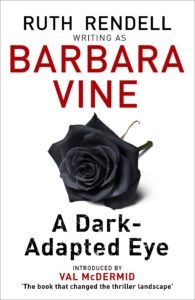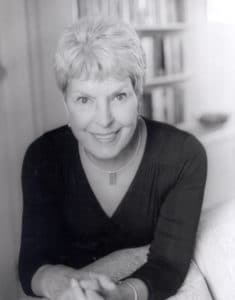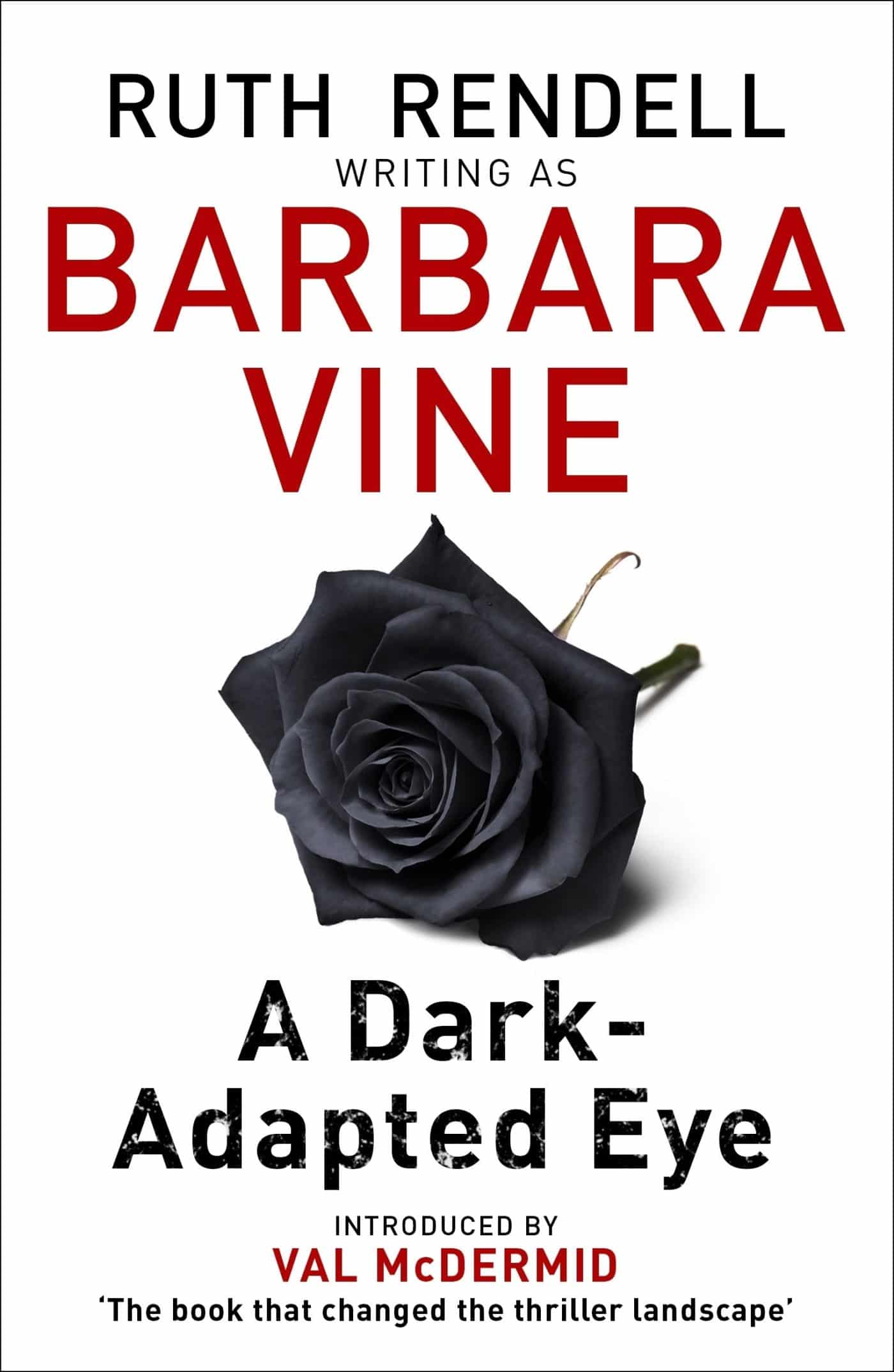Books
Val McDermid on Barbara Vine
Today, thirty years after it was first published, Barbara Vine’s A Dark-Adapted Eye is considered a modern classic – a book that changed the very foundations of the crime and thriller genre. Bestselling author Val McDermid introduces the novel in the new anniversary edition.
“The appearance of A Dark-Adapted Eye in 1986 was much more than an unexpected treat for the reader. It also signalled a significant shift in the direction of Ruth Rendell’s literary output. With the emergence of her nom-de-plume Barbara Vine, she laid down the gauntlet to herself to produce a different kind of novel to the ones she’d given us previously.
Most authors would have been satisfied by the accolades and awards she had been steadily accumulating. Not Ruth. Her restless imagination wasn’t satisfied with the Inspector Wexford police procedurals and the twisted psychological novels that sat alongside them on the shelf. She wanted to do something fresh. To challenge herself and to explore another side of her writing personality. To go beyond the whodunit and the whydunit to an investigation of how people deal with the secrets buried in their past and what happens when those skeletons edge out of the closet into the light.
 A Dark-Adapted Eye sent a clear message to readers that this new facet of Rendell’s output would be one to savour. From that opening sentence – ‘On the morning Vera died I woke up very early’ – and its successor at the start of the second paragraph – ‘In these circumstances alone one knows when someone is going to die’ – we know we are in a different fictional landscape from her other work.
A Dark-Adapted Eye sent a clear message to readers that this new facet of Rendell’s output would be one to savour. From that opening sentence – ‘On the morning Vera died I woke up very early’ – and its successor at the start of the second paragraph – ‘In these circumstances alone one knows when someone is going to die’ – we know we are in a different fictional landscape from her other work.
While this emergence of a new writing personality may have surprised her readers, it seemed entirely unexceptional to Ruth herself. As she explained it, ‘Ruth was my father’s choice of name for me, Barbara my mother’s. Her side of the family called me Barbara and my father finally started calling me Barbara too.
‘Both names are equally familiar to me, equally “my” names. If either were called out in the street, I would turn around. Ruth and Barbara are two aspects of me. Ruth is tougher, colder, more analytical, possibly more aggressive. Ruth is the professional writer. Barbara is more feminine. It is Barbara who sews. If Barbara writes, it is letters that she writes.
‘For a long time I have wanted Barbara to have a voice as well as Ruth. It would be a softer voice speaking at a slower pace, more sensitive perhaps, and more intuitive. In A Dark-Adapted Eye she has found that voice. There would be nothing surprising to a psychologist in Barbara’s choosing, as she asserts herself, to address readers in the first person.’
From our vantage point of thirty years distance, it’s hard to remember how strikingly ground-breaking A Dark-Adapted Eye was. No other crime writer was producing anything so emotionally and psychologically complex at the time. It demanded close attention from the reader because there was no way of knowing which detail would be the key to a telling revelation further along the twisting path of the story. It held its secrets close to its chest and held us readers in the tight grip of suspense.
 Because Ruth Rendell was already an experienced writer, she had developed skills that gave her absolute command over a complicated narrative structure that constantly doubles back on itself, paying out its revelations in a carefully measured way that’s calculated to keep us constantly wrong-footed. Faith Severn’s family have all been marked and damaged by the crime for which Vera Hillyard was hanged, and there is no writer better suited to filleting their lives for hidden shame than the psychologically acute Barbara Vine.
Because Ruth Rendell was already an experienced writer, she had developed skills that gave her absolute command over a complicated narrative structure that constantly doubles back on itself, paying out its revelations in a carefully measured way that’s calculated to keep us constantly wrong-footed. Faith Severn’s family have all been marked and damaged by the crime for which Vera Hillyard was hanged, and there is no writer better suited to filleting their lives for hidden shame than the psychologically acute Barbara Vine.
However, A Dark-Adapted Eye isn’t all Barbara. There is one crucial aspect that Barbara and Ruth share. For both writers, there is a fascination in going beyond the narrow world of the novel to explore themes and issues in the wider society beyond. In this novel, Barbara turns her gaze on the way women were expected to fulfil their roles as wives and mothers in the post-war period, and the price they paid when they transgressed those narrow tramlines and fell through the gap between aspiration and reality. She casts a penetrating look at the way people use their sexuality for their own ends and the damage that comes from keeping the truth hidden away. It’s a novel about love and fear, the line between insiders and outsiders, and the horror of using children as pawns in an adult game.
But most of all it’s about memory. The tricks we play on ourselves, the gaps we create to protect ourselves and the ones we love, the distortions of perspective we only understand from a distance.
Faith is forced to confront her own memories when a journalist decides to write a book about Vera and comes to her for help in unlocking the family sources. His probing pushes the narrative forward and sideways, painting a series of convincing portraits of all the key players along the way. Nobody arrives in a Barbara Vine novel without a hinterland, a thumbnail series of reasons and motivations for their behaviour, and this novel is crammed with warped and unexpected histories. And, as with the best thrillers, there is a final twist to leave the reader shocked and flicking back through the pages in an attempt to work out the answer for themselves.
A Dark-Adapted Eye won the Mystery Writers of America Edgar award for best novel of the year and none of us should be surprised. I read it in 1987 while I was waiting for my own debut novel to be published. Reading it was like a gift, a masterclass in what I dreamed one day of being able to achieve. It was also a salutary reminder of how far I had to travel.
Like so many other crime writers of my generation, I owe Ruth Rendell a huge debt of gratitude. The volume and versatility of her output was a constant spur. And because she wrote in different styles and voices yet still managed to take her readers with her, it gave publishers the confidence to trust other writers to attempt the same flexibility. She was an inspiration, and A Dark-Adapted Eye was one of the crucial landmarks in the landscape of crime fiction for writers and readers alike.”


Please note: Moderation is enabled and may delay your comment being posted. There is no need to resubmit your comment. By posting a comment you are agreeing to the website Terms of Use.